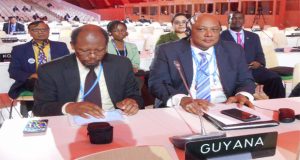GUYANA’A PUSH towards a “green economy” is being pursued from a “bottom-up” approach, Minister of Governance Raphael Trotman told the UN Climate Change conference in Paris Tuesday.“In the context of our pursuit of a green economy, our country has embarked on a pilot initiative to create Guyana’s first Green Town (Bartica). We hope, with adequate support, to transfer lessons learned to other urban centres in a truly bottom-up, and country-driven approach to green low emission development,” Trotman said in an address at Le Bourget conference centre on the outskirts of Paris where the talks are being held to secure a legally-binding climate agreement by the end of the week.
Bartica will be declared a town mid next year, and the community is involved in crafting a green development plan that is expected to be revealed by the Ministry of Public Infrastructure soon.
President David Granger has said that it could be possible to power all of the five other new towns touted, using clean energy sources.
In pursuit of the green economy, Trotman said the country is working to develop new sources of renewable energy, including hydropower.

Trotman told the Paris summit that Guyana is committed to the battle against climate change.
“Our abundant rainforests have, over the years, been conserved and sustainably managed. We are proud to say that we have among the lowest deforestation rates and highest forest carbon storage per capita in the world,” he stated.
Trotman noted that in 2009, in a pioneering partnership with the Kingdom of Norway, Guyana formulated and commenced implementation of a low carbon development strategy and a REDD Plus initiative. The REDD scheme is designed to reward countries which keep their rainforests standing.
“… not only is REDD Plus the most cost effective mitigation tool, but it is also impossible to achieve a target of 1.5 or even 2 degrees without the contribution of the world’s forests. We join with others in urging that the 2015 Agreement include a REDD Plus mechanism and a provision for the resources to implement it.”
CONCERN
Trotman said Guyana was extremely concerned at the low level of ambition in emission-reduction targets necessary to stabilise global emissions. Among the lowest emitters in the world, Guyana developed and submitted an iNDC ahead of the October 1 deadline.
“We are disappointed that aggregate targets and actions pledged in iNDCs still take us to almost 3 degrees warming. This is unacceptable, as it will spell disaster for Small Island and coastal low-lying developing states like Guyana, where most of our population and infrastructure exist at or below sea level. The Paris Agreement must serve to protect us.”
In this regard, he said Guyana was joining with the many other vulnerable countries in calling for commitments for medium and long-term emission-reduction pathways that are consistent with a 1.5 degree goal.
Trotman also used his speech to stress the need for mitigation measures.
“Given the current low level of mitigation ambition and the severe impacts that face vulnerable countries in the medium and long term, we cannot over-emphasise the importance of adaptation as a key element in the new agreement, with adequate resource provisions to support implementation of national adaptation actions. oUR support includES a mechanism for loss and damage in the new agreement.”
He said the special vulnerabilities of Small Island Developing States (SIDS) be explicitly recognised in the context of adaptation support; that such support be commensurate with our growing needs and be provided in a form that recognises the capacity constraints of SIDS.
Trotman urged developed countries to continue to take the lead in providing scaled up, sustainable, new, additional and predictable climate finance to developing countries, using the 2009 pledge of US$100 billion per year as a floor.
He said it was also imperative to recognise that both SIDS and Least Developed Countries face particular capacity constraints in accessing financial resources.
As such, he said the Paris agreement must include a commitment to improve access, including direct access, for these countries.
“Let us leave Paris with an ambitious, balanced, equitable legally-binding agreement that provides for the poor and the wealthy as equally as it provides for the strong and the vulnerable among us… let us give Paris the joyful gift of hope, and to the people of the world, the gift of a healthy and fruitful earth.”




.jpg)









